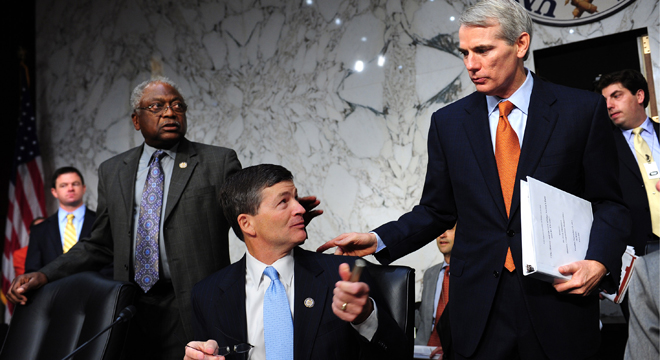Surprise! The deficit Super Committee is gridlocked! Because Republicans don’t want to raise taxes revenues at all.
And with less than a month to go before the Committee’s statutory deadline, the GOP’s leading lights and the stars of the conservative movement aren’t relenting one bit, leaving the panel’s Republicans little room to maneuver.
To the dismay of many progressives, several of the panel’s six Democrats agreed to feel out their GOP counterparts by putting forward a deal: Democrats agree to over a trillion dollars in spending cuts, including hundred of billions to Medicare providers and beneficiaries; Republicans agree to over a trillion dollars in higher revenues.
Republicans dismissed it out of hand, the plan leaked, and Democrats highlighted GOP intransigence to the press.
The plan, according to aides, is modeled heavily on the “grand bargain” President Obama and House Speaker John Boehner failed to reach. It failed just as predictably.
And if you look at the cues Republicans are taking from conservative groups and though leaders, it’s clear why. Though the Super Committee is officially called the Joint Select Committee on Deficit Reduction, Republicans see it solely as a vehicle for shrinking government. That means big cuts to government programs for poor, middle class, and retired Americans but positively no tax revenues, ever.
On Tuesday, the GOP’s favorite economist and perhaps its favorite governor teamed up for a presentation at the National Press Club to evangelize these views.
Hosted by economist Douglas Holtz-Eakin, president of the conservative American Action Forum, Mississippi Governor Haley Barbour laid it out plainly.
“We are interested in growing the private economy,” Barbour said. “We think bigger government means a smaller private economy.”
This was in the context of an event meant to provide policy guidance to a panel tasked with making budget decisions such as what to spend on and how to pay for it. But Barbour said tax increases should be off the table, thus providing a formula meant to shrink government, not to restore gravity to the country’s fiscal trajectory.
He couched his views in budgetary terms, but his actual argument was unmistakable.
“Dealing with the deficit requires controlling spending, there’s no question about that,” Barbour said. “Raising taxes is the enemy of controlling spending. Anybody that’s been in government any length of time understands that raising taxes is the enemy of controlling spending — they’re just going to spend it if you give it to them.”
There’s little evidence for this. During the last years of the Clinton administration, the government ran surpluses and used some of them to pay down the national debt. When George W. Bush took over, he cut taxes until deficits returned, and then increased spending to boot. “Deficits don’t matter,” was a fairly common GOP view.
A Democratic president in the White House changes things. The remaining Republicans and conservatives of any influence who would be willing to back new taxes are part of an endangered species. No wonder the Super Committee’s gridlocked.










